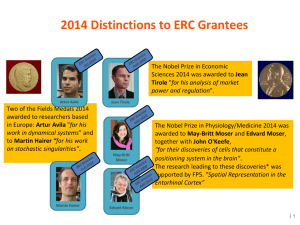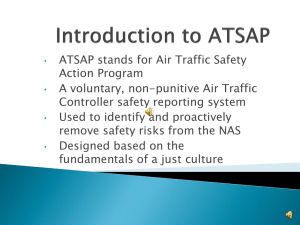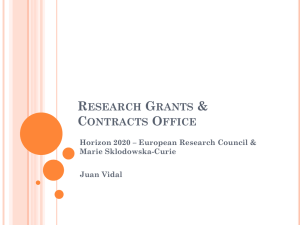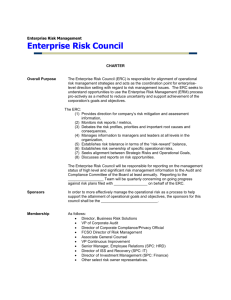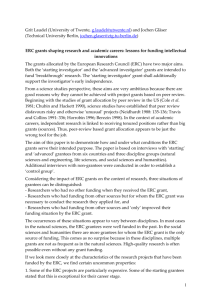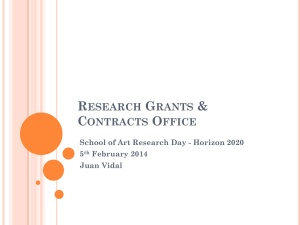FAQ on the ERC
advertisement
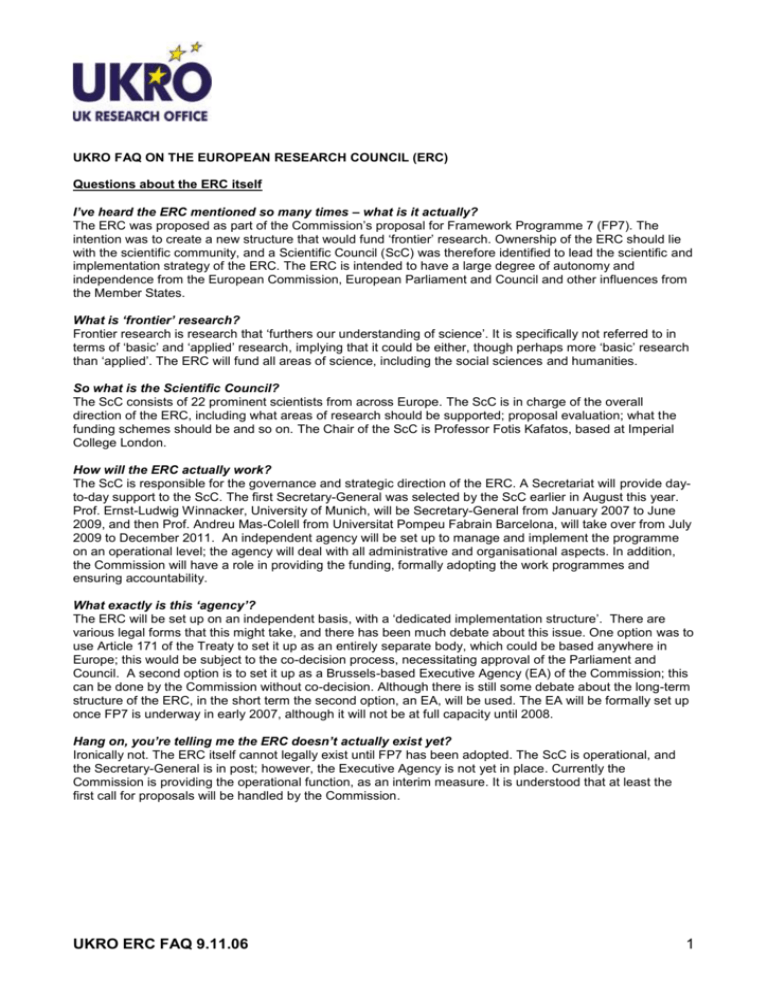
UKRO FAQ ON THE EUROPEAN RESEARCH COUNCIL (ERC) Questions about the ERC itself I’ve heard the ERC mentioned so many times – what is it actually? The ERC was proposed as part of the Commission’s proposal for Framework Programme 7 (FP7). The intention was to create a new structure that would fund ‘frontier’ research. Ownership of the ERC should lie with the scientific community, and a Scientific Council (ScC) was therefore identified to lead the scientific and implementation strategy of the ERC. The ERC is intended to have a large degree of autonomy and independence from the European Commission, European Parliament and Council and other influences from the Member States. What is ‘frontier’ research? Frontier research is research that ‘furthers our understanding of science’. It is specifically not referred to in terms of ‘basic’ and ‘applied’ research, implying that it could be either, though perhaps more ‘basic’ research than ‘applied’. The ERC will fund all areas of science, including the social sciences and humanities. So what is the Scientific Council? The ScC consists of 22 prominent scientists from across Europe. The ScC is in charge of the overall direction of the ERC, including what areas of research should be supported; proposal evaluation; what the funding schemes should be and so on. The Chair of the ScC is Professor Fotis Kafatos, based at Imperial College London. How will the ERC actually work? The ScC is responsible for the governance and strategic direction of the ERC. A Secretariat will provide dayto-day support to the ScC. The first Secretary-General was selected by the ScC earlier in August this year. Prof. Ernst-Ludwig Winnacker, University of Munich, will be Secretary-General from January 2007 to June 2009, and then Prof. Andreu Mas-Colell from Universitat Pompeu Fabrain Barcelona, will take over from July 2009 to December 2011. An independent agency will be set up to manage and implement the programme on an operational level; the agency will deal with all administrative and organisational aspects. In addition, the Commission will have a role in providing the funding, formally adopting the work programmes and ensuring accountability. What exactly is this ‘agency’? The ERC will be set up on an independent basis, with a ‘dedicated implementation structure’. There are various legal forms that this might take, and there has been much debate about this issue. One option was to use Article 171 of the Treaty to set it up as an entirely separate body, which could be based anywhere in Europe; this would be subject to the co-decision process, necessitating approval of the Parliament and Council. A second option is to set it up as a Brussels-based Executive Agency (EA) of the Commission; this can be done by the Commission without co-decision. Although there is still some debate about the long-term structure of the ERC, in the short term the second option, an EA, will be used. The EA will be formally set up once FP7 is underway in early 2007, although it will not be at full capacity until 2008. Hang on, you’re telling me the ERC doesn’t actually exist yet? Ironically not. The ERC itself cannot legally exist until FP7 has been adopted. The ScC is operational, and the Secretary-General is in post; however, the Executive Agency is not yet in place. Currently the Commission is providing the operational function, as an interim measure. It is understood that at least the first call for proposals will be handled by the Commission. UKRO ERC FAQ 9.11.06 1 Questions on Applying to the ERC OK, so what will the funding schemes be? The ScC has proposed two funding schemes for the ERC: The ‘Starting Grant’ and the ‘Advanced Grant’. The Starting Grant will provide support to researchers starting out as independent researchers. The Advanced Grant is open to all researchers, including those that are more experienced. What does ‘starting out’ actually mean? UKRO understands that this will be defined in terms of number of years’ experience, with some account taken of career breaks (such as for reasons of further training, illness and maternity/paternity leave). It is understood that the current maximum limit under discussion for eligibility for ‘Starting Grants’ is eight years from when the PhD was obtained (up to ten years in total with career breaks included). So is the support only for individuals then? The Starting Grant will be for individuals, and for teams built up around individuals. Teams can be based in either one country, or in several countries, including third countries. Essentially this will up to the proposer to decide, although it seems clear that any existing/potential network must be described and evaluated as part of the proposal. Proposals will also have to be submitted by the Principal Investigator in agreement with the hosting institution. What happens if I’ve already started my own team, could I still apply for the Starting Grant? Yes, both researchers wanting to set up independent teams and researchers who have recently set up independent teams should be eligible to apply for the Starting Grant. It is not yet clear precisely how this will work in practice. What happens with the contract when there’s more than one institution involved in the proposal? The contract will be between the Commission and the institution where the Principal Investigator is based. Separate agreements would then need to be put in place between the host institution and other institutions in the project. However, it appears that it will be up to the host institution to resolve such contractual arrangements. Will there be any limits on who can apply? No, not if you’re thinking of nationality criteria. The idea is that anyone can benefit from the schemes, provided that they will take up the grant in either the EU or Associated Countries. If the researcher is not based in the EU or an Associated Country at the time of application, then there should be a commitment from a European institution, that they will host the fellow if the proposal is selected for funding. It seems that the ERC is focused entirely on researchers in universities, is that true? No, the ERC Grants will be open to researchers of any legal entity type, including SMEs and industry, and there is no bias towards those in universities. Having said that, the ScC acknowledges that many investigators are likely to be based in universities, academies, research centres and similar establishments, and sees opportunities for the Grants to have a positive impact on these organisations in particular. As we see the evaluation criteria being developed it will be interesting to see on what grounds the ERC will be looking to judge the experience and excellence of researchers. Will there be any mobility requirements? No, mobility will not be an eligibility or evaluation criteria. I don’t understand – where is the European added value in funding one person in one country? The idea is that by introducing wider competition at a European level, all scientists will be encouraged to aspire to the same high standards, and the overall level of research carried out in the EU will increase. The ERC could also have an important structuring role in the EU, and help towards creating a further integrated European Research Area. UKRO ERC FAQ 9.11.06 2 How will the evaluation process work? There will be a two-stage evaluation process, with a very short outline proposal submitted at the first stage, and a more extensive proposal at the second stage. The second stage is likely to include an interview of candidates. The ScC is keen to avoid over-subscription, and may therefore try to limit the number of proposals that go through to the second stage. All proposals will be peer-reviewed. The ScC is keen to limit the administrative burden, and ensure that it is not too difficult to apply for funding, so strict page limits could be imposed on the proposal at both stages. So on what basis will my proposal be evaluated? A key feature of the ERC is that excellence will be the sole reason for selection of a proposal. Evaluation criteria will focus on the research excellence and potential of the individual, as well as the quality of the research. The excellence of the research environment, including commitment of the host institution to support the researcher’s independence, will also be considered. The ScC has been keen to stress that researchers should be independent, and should be granted autonomy by their host institutions. It is not the excellence of the institution that will be assessed, but the provision of research infrastructures available to the researcher, and the willingness to grant the researcher autonomy. It is not clear what the balance between the different criteria will be, or what thresholds would be applied, and how these would be assessed; such details are still under discussion. When will the calls for proposals be launched? UKRO understands that the ScC is keen for the first call to be launched at the end of 2006. The first call will only be for ‘Starting Grants’, and a call for ‘Advanced Grants’ will be launched in mid 2007. After that point, the plan is to have annual calls for both grants. Applications will be submitted electronically, and preregistration is likely to be required. How will they handle applications from different scientific fields? The ScC has identified 20 panels in various areas, and these panels will be responsible for peer review. Each panel comprises a Chair and around 10 members. Each proposal will be allocated to the relevant panel; panels may be assisted by additional evaluators. The panels are divided into three overall categories: social sciences and humanities, physical sciences and engineering, and life sciences. Budgets will be allocated to each of the three scientific domains. Although the panels deal with specific areas, particular attention will be given to multi-disciplinarity, as it is recognised that much frontier research will be of a multidisciplinary nature. What about the funding – how will this work? The ScC has suggested that funding is awarded in increments of €50,000, with the support ranging from between €100,000 – and €400,000 per year. The maximum duration of a grant is five years. Applicants would cost their proposal, but then the actual amount awarded will be at one of these set amounts, as determined by the peer reviewers. This is intended to reduce the need for negotiation of finances, and therefore reduce the time to contract. Costs will have to be project related and will be reimbursed against actual costs incurred. A maximum reimbursement rate of 100% funding for all direct costs has been proposed, with a 20% flat rate for indirect costs. Note that he ERC forms part of FP7, and so is subject to the Rules of Participation which have yet to be finalised. Can I reapply for funding if I’m unsuccessful the first time I apply? There will be some limits on re-applications, and applicants are unlikely to be able to submit proposals in successive years. This is one mechanism for reducing over-subscription to the programme. An ERC grant holder can only hold one grant a time (though individuals who have benefited from the Starting Grant should be able to apply for the Advanced Grant towards the end of their Starting Grant). You mention over-subscription – isn’t that going to be a problem? Potentially, yes. The ERC is likely to be extremely popular. It’s worth bearing in mind that this is likely to be very competitive, and to support the very best researchers and projects. The ScC is hopeful that there will be an element of self-selection, and that individuals and institutions will make applications only where they UKRO ERC FAQ 9.11.06 3 feel that they meet all of the evaluation criteria. In addition, measures such as the use of two-stage submission procedures should help reduce problems associated with over-subscription. So should I start writing my proposal now? Much of the detail of how ERC grants will work in practice and what the eligibility criteria will be, have yet to be finalised, in fact they are still very much under discussion. At present, application forms or guides for applicants are not available. So it’s too early to start preparing the proposal in detail, but certainly worth considering whether these are the kinds of grants you’d be interested in, and preparing your project ideas. If you are interested in the ERC, then you should certainly follow developments up to the official launch of calls. UKRO will keep all interested parties up to date with the latest news via the UKRO Information Services and respond to questions submitted as usual. Questions about Implementing and Managing ERC Grants Will setting up, managing and reporting on ERC grants be as bureaucratic as other Framework projects like in FP5 and FP6? Let’s hope not. The handling of these grants will be set up to keep matters simple, with short proposals, simplified agreements and less stringent reporting requirements on the cards. It remains to be seen just how straightforward this will be, and there may well be a few things to watch out for, such as how to involve and manage networks in the proposal, but the ScC has taken simplification quite seriously so far. Will I be able to take my ERC grant with me if I move institution? Yes, you will. The ScC hopes that grant portability will be a key feature of ERC grants, where appropriate. They recognise that researchers need to be able to move to take advantage of the best resources on offer. There’s clearly an incentive here for host institutions to think carefully about offering the best facilities for researchers, existing and potential ones. The ScC would like mobility of researchers to be straightforward, and while this is not exactly new to EU Framework funding, it should be more straightforward to administer transfers of these grants. The ERC wants to support ‘independent’ researchers with the ‘Starting Grants’. How will independence be defined and proved? UKRO understands that this means that the researchers should have the authority to apply for and manage research funding individually, the authority to publish as a senior author, the authority to supervise team members and have access to facilities necessary to conduct the research. UKRO also understands that this will actually be part of the eligibility criteria as well and at the second stage of applications, the legal entity (as proposed host to the researcher) must supply a statement confirming the above. Can I hold more than one ERC grant at the same time? No, a Principal Investigator may be associated with more than one application to the ERC during the same year and only one ERC grant can be active at any time. However, ERC Starting Grant holders can apply for an Advanced Grant during the last year of their Starting Grant award. Is there anything that administrators in hosting institutions should be wary of in particular? Much of the detail of the ERC grants has yet to be finalised so developments and published documents will need some scrutiny. It’s important for researchers and administrators alike to remember that proposals will have to be submitted by the Principal Investigator in agreement with the hosting institution. There are clearly some serious issues that will need to be resolved, not the least finances for the projects. With pre-set discrete levels of funding, as well as durations of up to five years, and the potential for much flexibility in management of the grant, careful financial planning and management will be important. The independence of researchers, with provision of a statement to that effect, will need to be carefully considered by hosting institutions. Also, dealing with a network of institutions may involve additional contractual arrangements. UKRO ERC FAQ 9.11.06 4 Further Information What guidance or support will there be for applicants and hosting institutions? In principle there should be similar documents for guidance as for Co-operative research actions under FP7, which would imply a Work Programme and a Guide for Applicants, as well as other documents to outline financial and reporting issues. The Commission also wants to establish National Contact Points (NCPs) for each Member State, who would field questions and provide guidance on participation. When will more information be available? The Work Programme should be approved in December. The first call for proposals will be launched in late December or early January, with an April deadline expected. Further details will be circulated through the UKRO Information Services as they become available. UKRO FP7 pages, available at: http://www.ukro.ac.uk/subscriber_services/fp7/index.htm ERC ScC website, available at: http://ec.europa.eu/erc/index_en.cfm UKRO ERC FAQ 9.11.06 5
